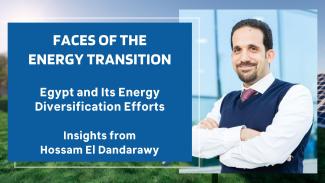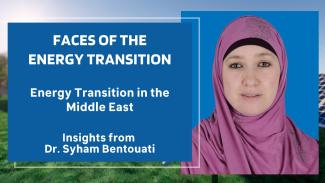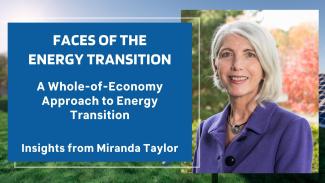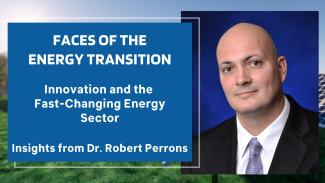
Egypt is a major gas producer in North Africa and the Middle-East with strengthened efforts to ramp up its renewable energy sources. Being the most populous country in the region, Egypt aims to maintain energy security by diversifying energy sources as evident in its Integrated Sustainable Energy Strategy (ISES) to 2035.
To give us insights on Egypt’s energy diversification efforts, we invited our Egypt partner and energy veteran Hossam El Dandarawy for an interview. Hossam El Dandarawy is a senior hydrocarbon energy executive with over 20 years international experience across 5 countries in management and leadership positions. He has a keen eye on progressing Egypt’s renewables as well as keeping the hydrocarbon business relevant through optimisation, embedding technologies and modernisation.
(This blog is published in time for the Egypt Petroleum Show (EGYPS) 2022, the largest oil and gas exhibition and conference in North Africa and the Mediterranean, which kicks off today (14 February 2022). EGYPS brings together major local and international stakeholders in the energy industry, both from the private and public sectors.)
Read his insights below.
How would you describe the overall direction of Egypt’s energy sector? How do you see the energy mix changing in the coming years?
The Energy Sector in Egypt is mostly dependent on hydrocarbon energy generation, but is now also much more diversified with the introduction of large scale solar power projects and the upcoming prospect of nuclear power not far away.
I see that hydrocarbon energy will continue to play a huge role in Egypt’s energy sector and economy for the foreseeable future - certainly in areas like commercial aviation where there is no realistic substitute and now also with increased LNG exports to Europe and some areas in the Middle East.
However, renewables such as Solar are expected to take up a larger market share in the coming years with the availability of such high output projects like Benban (targeting over 1,600MW) and favourable sunny weather most of the year.
Another strong addition to the renewables portfolio in Egypt are Wind Farms in areas such as Ras Ghareb and Za’farana (targeting over 500MW). Egypt is also hosting COP27 in Sham El Sheikh later in November 2022.
This year’s EGYPS was announced to tackle how the oil and gas sector can be more sustainable. What do you think should be the sector’s priorities to make it more sustainable?
I think that a sustainable Oil & Gas sector is very high on Egypt’s agenda at the moment and this is already a very wide topic with plenty of lateral focus on a daily basis. Some of the ideas already gaining momentum include improving supply chain, improving public environmental awareness (especially in marine operations) and developing a national strategy through growth and technology (improving efficiency from end to end and reducing fugitive emissions, GHG reductions and CO2 capture).
There are also other catalysts within the hydrocarbon industry such as more efficient project execution, smarter field development, digitization (especially post covid-19) and the government’s own modernization agenda which is steadily transforming Local Oil & Gas entities.
How huge is the role of the private sector in diversifying Egypt’ s energy mix? How active is it now in introducing renewable energy to the mix?
The private sector in Egypt plays a key role in conjunction with the Government to make possible the ambitious agenda set by leadership in Egypt. Good examples are prospective Green Hydrogen pilots which would potentially also require strong custodianship by local private companies in partnership with international suppliers as well. I believe that local capability building is central to Egypt’s roadmap and this is also pivotal to ensuring that new technologies and energy solutions are brought to market as soon as possible, while keeping a strong focus on optimising and increasing efficiency in hydrocarbon operations. If we re-focus on the hydrocarbon industry itself in Egypt, we see much more diversity of players, mostly medium- sized companies. This may also apply to future outfits targeting renewables.
What do you think should be next for Egypt’s energy business?
By continuous focus on the optimization of hydrocarbon resources, operations as well as LNG exports, Egypt can grow a steady portfolio of energy resources together with Solar, Wind and potentially even Green Hydrogen. This will work to support the economy and also meet renewables targets. Of course, such a task can only be done through people and capability remains central as well as diversified partnerships.
TechnologyCatalogue.com’s Faces of the Energy Transition blog series aims to shed light on key issues surrounding the global transition to clean energy. We invite thought leaders, industry players and members of the academe to share their insights on topics that are related to the Energy Transition.
If you have suggestions on topics and/or resource persons, feel free to reach out via email at community@technologycatalogue.com.
Note: If you are a supplier, end-user or tech expert based in Egypt, you can reach out to Hossam on how TechnologyCatalogue.com can assist you in your technology positioning or deployment and selection activities.
Subscribe to our Newsletter
Related Blogs

Energy Transition in the Middle East: Insights from Dr. Syham Bentouati
The Middle East is home to many oil-producing countries and has been a key player in the global energy industry. To give more information on the overall Energy Transition journey in the Middle East, we requested our partner for Oman Dr. Syham Bentouati to answer some key questions about this subject.

A Whole-of-Economy Approach to Energy Transition by Miranda Taylor
What can other industry sectors do - individually and collectively – to accelerate their action to achieve net zero carbon emissions? We invited energy and resources industry expert Miranda Taylor to give her insights into this ‘economy wide’ approach and how the different sectors are influencing each other to act.

Innovation and the Fast-Changing Energy Sector by Dr. Robert Perrons
With the rapid technological changes in the sector coupled with sustainability being a central concern for the industry, we find it helpful to thresh out some of the key issues surrounding technology and innovation in the energy sector. In this blog you can read Dr. Robert Perrons' (professor of Technology Management and Strategy at the Queensland University of Technology) insightful answers to our questions on innovation in the energy sector.
